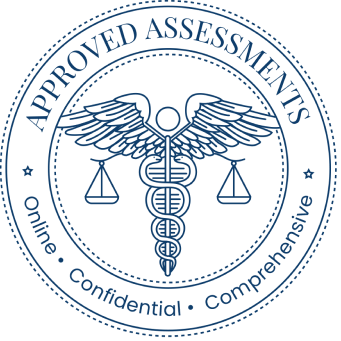Approved Assessments’ patented AI technology gathers this information while eliminating bias and reducing the survey burden. Detailed bio-psycho-social, mental health and substance histories arrive on the providers’ dashboards immediately after the client finishes. This brilliant, easy-to-read, editable assessment empowers providers and clients on the first visit. Once the client completes the screening, an artfully written document arrives on the dashboard to edit. The summary page compiles the six dimensions fulfilling the American Society of Addiction Medicine (ASAM) criteria:

A Whole Health Approach, Resulting in an Excellent Report, Free of Bias.
Does Childhood Trauma Lead to Crime
Criminogenic behaviors fluctuate and respond to treatment interventions. This is unlike the static criminal risk factors that steadily rise with little change despite treatment intervention. Current research points toward the Risk-Need-Responsivity (RNR) model for the criminal justice system.
This model identifies and prioritizes individuals to receive appropriate interventions. The data collected through Approved Assessment’s screener provides the information necessary for identifying and prioritizing individuals for treatment by connecting behavioral health needs to criminogenic risk. Criminogenic risk factors should be identified at the earliest stage of criminal justice involvement. Individuals should be reassessed over time. This assessment offers crucial insights for assessing the likelihood of re-offense and revocation. Moreover, it assists in shaping pre-sentencing and sentencing strategies, as well as facilitating effective case management.
Approved Assessments incorporates the most up-to-
date evidence-based guidelines for conducting
assessments.
The eight risk factors below increase an individual’s risk for future criminal behavior. The top four risks are dynamic predictors that can be changed if addressed appropriately.
Dynamic Factors
Static Factors


Let SCREENS do the Screening | Let Providers PROVIDE
Amid growing demand for mental health services, the nation is at the threshold of a severe shortage of psychiatric services.
Our mental health crisis suffocates providers and staff with numerous, complex, traumatized patients. Left unaddressed, the opportunity for help fades as costs soar.
High-quality help begins with a thorough, personalized assessment. For decades we’ve known that with time, the assessments completed by staff become less accurate due to errors and bias. The integrity of assessments fades further as the gap between resources and demand widens. Armed with the most comprehensive intake on the market, Approved Assessments puts providers back in front of the patient. We leverage patented technology to gather the information thoroughly, personal to each situation, and in accordance with the latest recommendations for industry standards.
Combat our Mental Health Crisis
Start with timely, thorough screenings
Get The Facts 

Approved Assessment VERSUS a PhD : Who won?
Recovery from substance-related issues remains a significant challenge nationwide, with low success rates. The Cheyenne River Sioux Reservation is an example of a community striving to make a meaningful impact with extremely limited resources. Identifying behavioral health problems and addressing past trauma is crucial to achieving positive outcomes. In South Dakota’s Criminal Justice System, mental health screening is required before sentencing for substance-related crimes. However, multiple barriers, including understaffing and underfunding, hinder timely and thorough assessments. The COVID-19 pandemic further exacerbated access to care, preventing counselors from screening individuals in jails. To overcome these challenges, the Pilot Project for Comprehensive Mental Health Assessment aims to evaluate Approved Assessments, our electronic assessment tool used outside of jails, and compare it to the traditional in-person assessment.
About Dr. Bosworth

Annette Bosworth, MD, has been practicing Internal Medicine since 2001, primarily focusing on enhancing care for patients recovering from trauma, addiction, and mental health challenges. She emphasizes holistic assessments that consider substance use, mental health needs, and a complete biopsychosocial history for marginalized individuals in South Dakota, including AI/AN and other minority populations. Dr. Bosworth has provided training to over 1,500 community members, including researchers, treatment providers, physicians, teachers, police/correctional officers, elected officials, tribal leaders, spiritual leaders, medicine healers, parents, and patients throughout South Dakota.
While recently relocating her practice to Tampa, FL, Dr. Bosworth continues to demonstrate leadership, offer education, and deliver medical services to enhance the care for patients recovering from trauma, addiction, and mental health struggles. In 2015, Dr. Bosworth collaborated with the Oglala Sioux Tribe Adult Offenders Unit on the Pine Ridge Indian Reservation to provide holistic, culturally sensitive services for incarcerated community members. During her volunteer work in this prison and other shelters and Drug Courts, she observed the unequal treatment of individuals funneled into the criminal justice system.
The patients on the margins faced endless obstacles, including access to professional services, schedules, transportation, and a basic understanding of the criminal justice system. Moreover, assessing incarcerated community members often took months or never occurred. Dr. Bosworth drew upon her unique approach to managing chronic diseases through a checklist manifesto methodology. By integrating Electronic Healthcare systems and focusing on traumatized brains, she developed Approved Assessments, LLC—a comprehensive electronic holistic brain assessment that can be “Uubered” into the most marginalized communities.
The Department of Public Safety subsequently tested this assessment in the Cheyenne River Sioux Tribe in the tribal jail of Eagle Butte, SD, comparing the pre-sentencing screenings done by an in-person Ph.D. to Approved Assessments. The findings found Approved Assessments to be a more thorough, timely, cost-effective, and reproducible method for screening within a jail population, while being equal to an in-person assessment by a Ph.D. psychologist in quality.
Let Screens Screen and Providers Provide:
We deliver a rich pre-appointment comprehensive brain assessment, facilitating an advanced client-provider conversation to serve the patient immediately while reducing the survey burden on providers.
© 2024 Approved Assessments, All Right Reserved. U.S. Provisional Appl.

 Roughly 50 million Americans are suffering from mental illness
Roughly 50 million Americans are suffering from mental illness